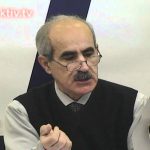BAKU, Azerbaijan — From my seat in the back of the sparkling purple-lit stadium at Eurovision Song Contest, it was hard sometimes this week to distinguish the pageantry of Europe’s largest international pop music competition from the pageantry of Azerbaijan’s self-promotion.
For example, each of the 18 acts in the first semi-final on Tuesday night began and ended with a 30-second promotional spot depicting this small, oil-rich South Caucasus nation as the ultimate tourist destination. “Azerbaijan: Land of sun!” the advertisements read. “Land of water!” “Land of horsemen!”
Even outside Baku’s brand new Crystal Hall — the 23,000-seat space age auditorium specially built for this five-day event — loudspeakers, billboards and posters treated visitors to a relentless catalog of Azerbaijan’s fabulousness. “Land of poetry!” “Land of flames!”
They didn’t say, of course, that Azerbaijan is also a land of repression. And a land of censorship and K.G.B.-style surveillance, where young activists are routinely jailed for criticizing the government in blogs or on their Facebook pages. When the dry ice clears after this week, the estimated 125 million people who’ll have tuned in to watch Eurovision this year should not lose sight of the human rights abuses unfolding just behind Azerbaijan’s shiny new facade.
In the past few months, Azerbaijani authorities have continued to harass, intimidate, beat and imprison journalists, activists and opposition figures, leading Reporters Without Borders to rank Azerbaijan 162 out of 179 countries in terms of press freedoms — four spots behind Saudi Arabia. Dozens of local activists are now in prison, including Bakhtiyar Hajiyev, a young Harvard graduate and outspoken critic of the government. Amnesty International has called for the immediate release of 17 political prisoners.
Just as alarming, Human Rights Watch and local NGOs have reported that in Azerbaijan’s quest for rapid development — beginning in 2009, but particularly in the lead-up to this week’s influx of international attention — the government has forcibly bulldozed hundreds of homes to make way for new infrastructure and buildings. Some 281 families are said to have been evicted in exchange for very little compensation so that the purple sequined Crystal Hall could sprout from the shoreline.
International human rights and democracy groups, as well as the Council of Europe — which admitted Azerbaijan as a member in 2001 — have been highly critical of Azerbaijan’s enduring disregard for its citizens’ rights. But many local activists say this isn’t enough.
“There’s nothing we can do. Europe wants Azerbaijani oil,” a 21-year-old activist in Baku told me Tuesday. (He didn’t want his name used for fear of retribution.) “We blog and post on Facebook and fight for our rights, and the government beats us, puts us in jail. We protest for our right to protest. But every time, it is the same.”
The United States and Europe have pretty good political and economic reasons to stay mum. Azerbaijan now exports about one million barrels of oil per day, mostly through the Baku-Tbilisi-Ceyhan pipeline and for consumption in Europe. NATO countries also rely heavily on Azerbaijan as a transit route for supplies heading to Afghanistan, an arrangement that has become even more crucial in recent months as U.S.-Pakistani relations have faltered.
“This week is a battle for hearts and minds,” one young activist and student told me, lowering her voice almost to a whisper on Baku’s bustling seaside boardwalk. “The government spends millions, millions of euros, showing it is a rich European country, a democracy. We can do nothing but hope people know it’s not true.”
Though the actual amount the Azerbaijani government spent on this week of relentless self-promotion is unclear, the local NGO Public Association for Assistance to Free Economy, which tracks government spending, put the number at about $800 million. This figure includes the cost of building Crystal Hall, the two-kilometer road linking the hall to downtown Baku, the purchase of a fleet of new purple Eurovision taxis and various beautification projects undertaken throughout the city in the past few months.
Aside from two small protests staged by opposition groups in downtown Baku on Monday afternoon, so far government critics have assumed understated methods of protest this week. Some activists were wearing white “Sing for Democracy” T-shirts in the same style as the Eurovision T-shirts on sale around the city.
Others plastered atop the ubiquitous Eurovision billboards subversive stickers asking, in Azerbaijani: “Jobless today. Homeless tomorrow. What about the day after that?”
“The day after that,” the 21-year-old activist told me, “the crowds will be gone, the cameras will be gone, and it will just be us and the government. And they will do what they like.”
 By HALEY SWEETLAND EDWARDS
By HALEY SWEETLAND EDWARDS

